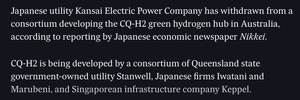JohnDe
La dolce vita
- Joined
- 11 March 2020
- Posts
- 4,578
- Reactions
- 6,745
Origin Energy has joined the exodus from the Hydrogen bandwagon.
From Evil murdoch press
Origin Energy is abandoning its ambitious plans to develop hydrogen in the country’s industrial heartland in another blow to the Albanese government’s dreams for the energy source to help drive the transition to net zero.
The group said on Thursday that the decision to exit the proposed Hunter Valley Hydrogen Hub project reflected uncertainty around the “pace and timing of development of the hydrogen market” and the risks associated with developing capital-intensive projects of this nature.
It comes after billionaire Andrew Forrest earlier this year cancelled his own green hydrogen targets in a major business backdown that resulted in the loss of 700 jobs at his flagship company Fortescue.
Origin chief executive Frank Calabria says the company had worked hard to evaluate the investment case for hydrogen and continued to believe hydrogen could play a role in the future energy mix.
“However, it has become clear that the hydrogen market is developing more slowly than anticipated, and there remain risks and both input cost and technology advancements to overcome,” said Mr Calabria. “The combination of these factors mean we are unable to see a current pathway to take a final investment decision on the project.”
Mick
Reality, the shortage of spare cash and possible strong competition has got big business spooked.
Reality - the theory is good; the practical application is expensive and dangerous.
Cash, it's running low: The Albanese government has promised to back Hydrogen, but they're looking more and more like a one term government.
Competition: The cost of electricity production from renewables is coming down faster than anticipated, and the Australian voter is warming to the idea of nuclear power stations.







